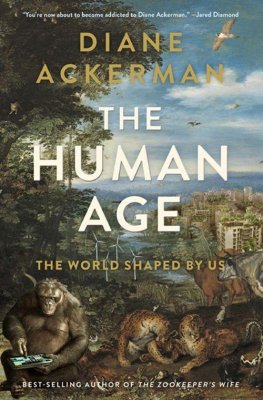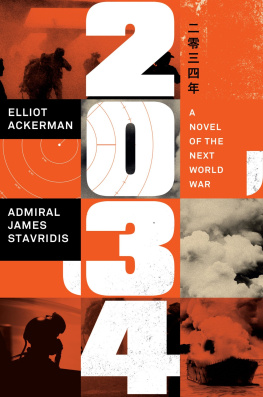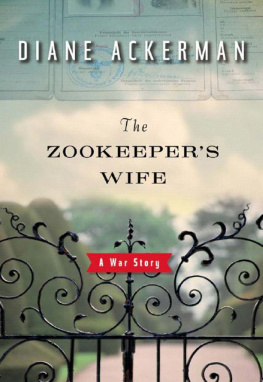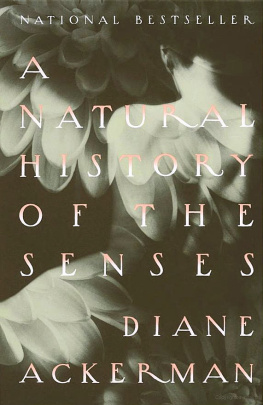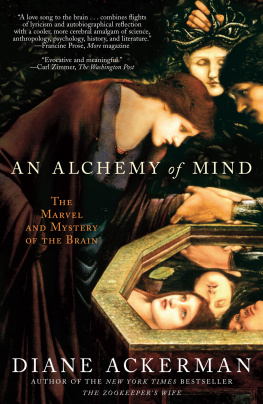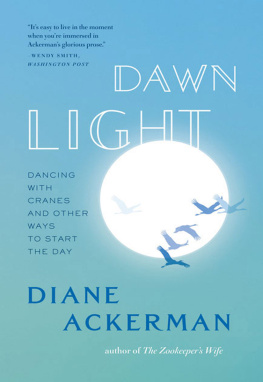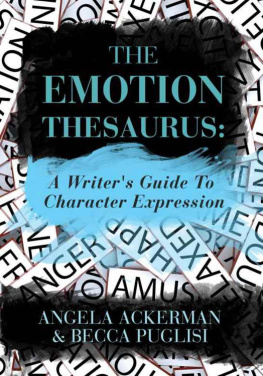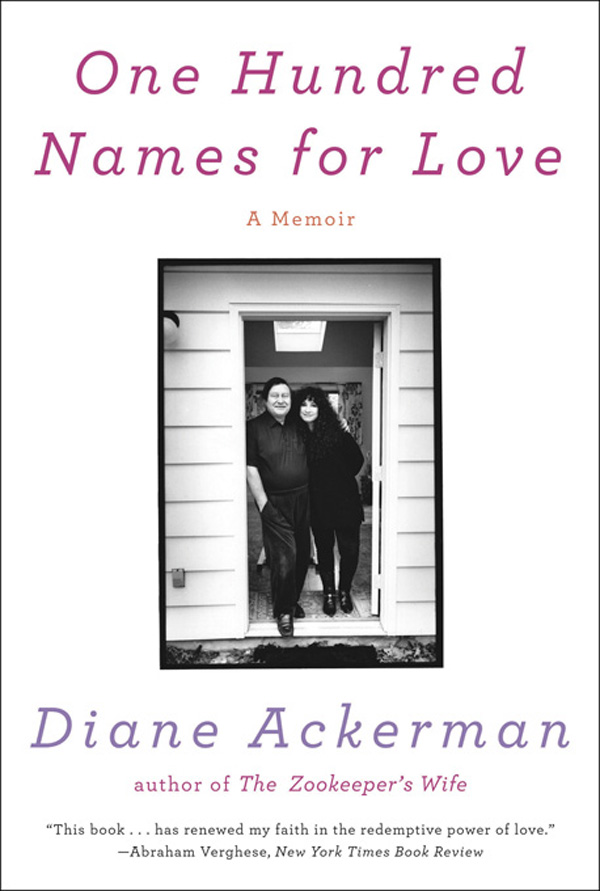
ALSO BY DIANE ACKERMAN
Dawn Light
The Zookeepers Wife
An Alchemy of Mind
Cultivating Delight
Origami Bridges
Deep Play
I Praise My Destroyer
A Slender Thread
The Rarest of the Rare
The Moon by Whale Light
A Natural History of the Senses
A Natural History of Love
Jaguar of Sweet Laughter
Reverse Thunder
On Extended Wings
Lady Faustus
Twilight of the Tenderfoot
Wife of Light
The Planets: A Cosmic Pastoral
For Children
Animal Sense
Monk Seal Hideaway
Bats: Shadows in the Night
ONE
HUNDRED
NAMES
FOR
LOVE
A MEMOIR
DIANE ACKERMAN

W. W. NORTON & COMPANY
NEW YORK LONDON

CONTENTS
PART ONE

THE
CARTOGRAPHY
OF LOSS
CHAPTER 1

T RAILING PLASTIC TUBES, PAUL MADE HIS WAY ACROSS THE room, steeped in twilight, and I was struck by how the body sometimes looks like the sea creature it is, a jellyfish with long tentacles, not really a fish at all but a gelatinous animal full of hidden symmetries, as well as lagoons and sewers, and lots of spongy and stringy bits. But mainly salt water. Lugging tubes and cables, he had joined the hospitals bloom of deep-sea creatures. But all that would soon change because hed been cleared to leave the following morning, though hed still be taking potent antibiotics.
We escape at dawn! he stage-whispered over his shoulder in a British sergeant-major voice. The prospect made us both a little giddy.
For three weeks, hed languished in this high-tech cove, with a kidney infection that had waxed systemic, one of those staph bugs older than sharks or ginkgo trees, and Id camped out with him lest he trip over the leashes dripping fluids into or out of him.
Id been on book tour for An Alchemy of Mind when I learned Paul had to be hospitalized, and curtailed my travels to fly straight home. But the magic and glory of the brain was still very much on my mind, so, lounging in a visitors chair, propped up on pillows, I passed the time browsing back issues of Cerebrum and Brain in the News . From my thermos, I poured us cups of the hot grain drink Roma, which smelled of chicory and graham crackers.
After all, wed been down this wharf before, too many times. Twenty years earlier, when he was only fifty-five years old, Paul had battled a devastating heart arrhythmia that nearly killed him. After months of my sensing that something wasnt quite rightthe jazz I heard in his chest when we curled up in bed; how pale and clammy he sometimes grew, especially after mealsId finally convinced him to see a doctor by insisting it was the only thing I wanted for Christmas, the gift of being able to set my mind at ease. A friend had recommended a superb and kind cardiologist in a nearby city, whose verdict was that Paul needed a pacemaker to chime in whenever his heart paused too long between beats. Otherwise he might suddenly pass out, maybe for good, just as his father had from the same malady in his seventies. For Paul, that meant a weeklong hospital stay in Syracuse, the first of many such trysts, and Paul lamenting, broken-spirited: I used to be such a lion.
When he woke up, after a four-hour surgery during which his heart had twice spat out a pacemaker wire, cleverly insinuated down veins and lodged in the heart muscle, Id greeted him with my best hundred-watt smile, and holding a stuffed lion.
Ever since that day, wed driven the hour-and-a-half over wintry, dimly lit roads for checkups, pacemaker tests, and echocardiograms, always anxious, then relieved, and sometimes edgy again, living a predictably uncertain life, much like the regular irregularity of his arrhythmic heart.
Other medical escapades followed, like the time when routine lab work revealed a blood sugar level of 800 (normal is around 100), signaling diabetes, and a new regimen began of blood-sugar tests, a special diet, and three more pills. Or when Pauls blood pressure kept soaring, and we had to drive that glassy road to Syracuse again and again, to monitor and reblend his cocktail of medicines. Or the days he fretted in the hospital in Ithaca, receiving IV antibiotics for cellulitis, an infection of his body tissue that began innocently, at a small scratch on his toe, but quickly launched a dangerous campaign up his foot and leg.
This time, a systemic infection was scary enough, but not as harrowing as what wed been through before. Since the hospital was likely to be our home for a few weeks, we had settled in as best we could. I provided a pantry of canned goods and snacks on a corner table, scented soap and favorite comb in the bathroom, cozy slippers, my knitting, and a library of books along the windowsill. Paul adapted in his own inimitable way: he grew so bored that he wrote a complete sonnet cycle about the Egyptian god Osiris.
The past three weeks had been alternately calamitous and withering, as Paul battled the staph infection and also kidney stones that had to be shattered with laser strikes, and Id felt picked over by the gulls of worry. The inescapable din of shifts changing, trolleys rattling, visitors streaming, and machines pinging had played havoc with my peace of mind. At least Id been able to come and go, while Paul felt bedfast and caged almost to the point of frenzy. Every evening we watched the setting suns hallelujahs beyond the sealed window and ached to go home. I looked forward to our being alone together again and at ease, among native routines, with hour upon hour of unfailing quiet.
THEN THE LIGHTNING strike. Paul shuffled out of the bathroom and stood at the foot of the bed, eyes glazed, his face like fallen mud. His mouth drooped to the right, and he looked asleep with open eyes that gaped at me in alarm.
Whats wrong?
He moved his lips a little, making a sound between a buzz and a murmur. For a moment I had the odd thought he might have a mouthful of bees. Then my spine filled with ice, and I felt as if the floor dropped twenty feet. A decade before Paul had had a Transient Ischemic Attack (TIA), a brief stoppage of blood flow to the brain, igniting strokelike symptoms that pass, but often predict a true stroke. I recognized its burred speech and rigid face. Anything but that! I thought, struggling to comprehend. Not now! Not again!
Are you having a stroke? I finally found the words to ask. But he didnt need to answer. I could feel my head shrinking tighter, as I leapt to my feet and frantically guided him into my chair. Then I grew suddenly numb and thought: This cant be happening! Stay calm! Figure out what to do! Maybe its just another TIA, like last timea nightmare, but not the end!
I ran for help, sighted a nurse, and blurted out: I think my husbands having a stroke! And together we rushed back to the room, down quaking corridors, and found Paul sitting like a stone pharaohhands in his lap, expressionless, staring straight ahead.
Please get a doctor, get a doctor! I pleaded. If its a stroke and he needs to be given tPA, there isnt much time! I knew of tPA, the miracle clot-busting drug that can sometimes reverse a stroke if its given during the first three hours. TPAthe letters sounded like a dead ringer for abracadabra .
Next page

